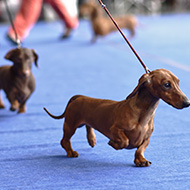
The review will consider what veterinary checks are required before and during shows.
The Kennel Club has announced plans to review its Breed Watch programme.
An 'early warning system' to identify points of concern for individual dog breeds, Breed Watch provides further information about specific health concerns to anyone involved in dog welfare.
Its purpose is to discourage the breeding of dogs with exaggerated conformational issues, such as bracycephalic dogs or those with excessive skin folds. The scheme also provides an opportunity for all involved to monitor and protect the future of pedigree dogs.
Working with experienced judges, vets and dog show exhibitors, the Kennel Club aims to ensure the system remains effective in monitoring, protecting and improving the health and welfare of dogs.
The review will consider what veterinary checks are required before and during shows and what Kennel Club guidance and training is required for the vets involved.
It will also examine what educational materials are needed to support judges and exhibitors more effectively and what training would enable judges to recognise breed-specific health concerns.
Ian Seath, chair of the Breed Standards and Conformation Sub-Group, commented: “We are really pleased to be implementing this important development of Breed Watch, alongside the wider community, to ensure it’s the best possible system for monitoring the health and welfare of dogs.
“This underlines our commitment to protecting and improving the health of dogs in the show ring specifically. Regular updates on progress will be provided in due course, and I’d recommend all those involved in showing or judging dogs to attend The Kennel Club’s free Breed Watch webinar in February to understand more about how we can all play a part.”
The webinar takes place via Microsoft Teams on Thursday, 9 February 2023, 6:30pm-7:30pm. To register, click here.
More information about the Breed Watch programme is available at kennelclub.org.uk



 BSAVA is to partner with BVA Live (11-12 June 2026) to champion clinical research.
BSAVA is to partner with BVA Live (11-12 June 2026) to champion clinical research.